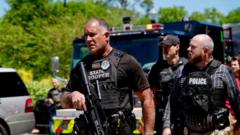In a pivotal address, NATO Secretary General Mark Rutte stressed the critical need for member nations to enhance defense spending as tensions with Russia escalate. He cited a dire security situation and called for a shift to a more proactive, wartime mentality, reminiscent of Cold War expenditures. Rutte's remarks come as he underscores the looming threat from Russia's increased military budget and prepares for a potential return of Donald Trump to the White House, who previously pressured NATO allies to meet defense spending commitments.
NATO's Urgent Call for Increased Defense Spending Amidst Rising Threats

NATO's Urgent Call for Increased Defense Spending Amidst Rising Threats
Secretary General Mark Rutte emphasizes the need for NATO members to adopt a wartime mindset and significantly boost defense budgets in response to escalating tensions with Russia.
NATO Secretary General Mark Rutte has issued a stark warning that member nations must transition to a "wartime mindset" in light of intensified hostilities with Russia. Rutte described the current security landscape as the most precarious of his lifetime, stating that countries within the alliance are inadequately preparing for an inevitable conflict with Moscow.
In his inaugural address since assuming the NATO leadership role in October, Rutte urged allies to "turbocharge" their defense expenditures, emphasizing a sense of urgency as he perceives danger from Russia approaching at a rapid pace. His remarks come just weeks before the anticipated inauguration of President-elect Donald Trump, who has previously suggested that the U.S. might reconsider its commitments to NATO allies that fail to meet defense spending targets.
NATO members have committed to allocating at least 2% of their GDP towards defense by 2024; however, Rutte highlighted that considerable increases would be necessary to address the escalating risks. He noted that European nations allocated over 3% of GDP for defense during the Cold War, stressing the importance of current investments to avert future conflicts.
Rutte noted that Russia has transitioned its economy to a war footing, with projections showing that defense spending might constitute one-third of its national budget by 2025, marking the highest level since the Cold War. Following Russia's extensive military action in Ukraine, the Kremlin has signaled record defense funding for the coming years.
As Russian forces continue to gain ground in Ukraine, Rutte's words resonate amid a critical juncture in the ongoing conflict. While NATO members in Europe and Canada average 2% defense spending, some have yet to meet their commitments. Trump's earlier statements regarding incentivizing Russia to attack non-contributors to NATO have lingered in discussions.
In a post-speech interview, Rutte acknowledged Trump's previous success in prompting NATO allies to increase spending during his first term and referred to him as "completely right" in this aspect. Dubbed "The Trump Whisperer" by some within NATO, Rutte seeks to ensure continued American commitment to the alliance.
Recognizing that defense spending may clash with public preferences on issues like health and cost of living, Rutte made a heartfelt appeal to citizens across NATO nations, urging them to advocate for prioritizing defense funding. He stated that the long-term preservation of democracy and shared values hinges on proactive defense strategies, warning of potential grave difficulties if action is not taken within the next four to five years.




















